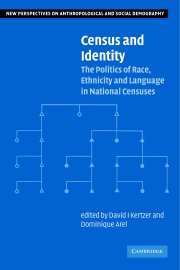Book contents
- Frontmatter
- Contents
- Contributors
- Preface
- 1 Censuses, identity formation, and the struggle for political power
- 2 Racial categorization and censuses
- 3 Ethnic categorizations in censuses: comparative observations from Israel, Canada, and the United States
- 4 Language categories in censuses: backward- or forward-looking?
- 5 Resistance to identity categorization in France
- 6 On counting, categorizing, and violence in Burundi and Rwanda
- 7 Identity counts: the Soviet legacy and the census in Uzbekistan
- Index
- References
2 - Racial categorization and censuses
Published online by Cambridge University Press: 03 December 2009
- Frontmatter
- Contents
- Contributors
- Preface
- 1 Censuses, identity formation, and the struggle for political power
- 2 Racial categorization and censuses
- 3 Ethnic categorizations in censuses: comparative observations from Israel, Canada, and the United States
- 4 Language categories in censuses: backward- or forward-looking?
- 5 Resistance to identity categorization in France
- 6 On counting, categorizing, and violence in Burundi and Rwanda
- 7 Identity counts: the Soviet legacy and the census in Uzbekistan
- Index
- References
Summary
Race and census-taking occupy, at present, two discrete but related fields of study. Historians, sociologists, political scientists, anthropologists, legal scholars, theorists, and, of late, cultural critics have taken up the study of race. They seek to explain what race is (and is not), and how, if not why, it matters socially, culturally, economically, and politically. Census-taking has been treated as the domain of demographers and statisticians who examine and study how census-taking, and hence census data, can be made more accurate. Although never hard and fast, disciplinary and conceptual boundaries have kept our understandings of race and census-taking separate, and have thus impoverished our understanding and study of both. Not surprisingly, the parameters that scholarship has managed to erect bear little resemblance to the very real connections between race and censuses in political and social life. Race, however ambiguous, seems a permanent feature of politics in numerous societies. Policymakers, statisticians, scholars, and the general public treat racial census data as important basic facts, and as raw materials for socioeconomic analyses and for public policies. Given the evident importance of race and racial statistical data in public life, explaining the dynamic between race and censuses is both a necessary and illuminating undertaking.
This chapter argues that censuses help to constitute racial discourse. Racial discourse, in turn, helps to shape and explain public policy outcomes. In this argument, census-taking contributes to the formation and perpetuation of racial ideas; but it is not the only state process to do so.
Information
- Type
- Chapter
- Information
- Census and IdentityThe Politics of Race, Ethnicity, and Language in National Censuses, pp. 43 - 70Publisher: Cambridge University PressPrint publication year: 2001
References
Accessibility standard: Unknown
Why this information is here
This section outlines the accessibility features of this content - including support for screen readers, full keyboard navigation and high-contrast display options. This may not be relevant for you.Accessibility Information
- 12
- Cited by
